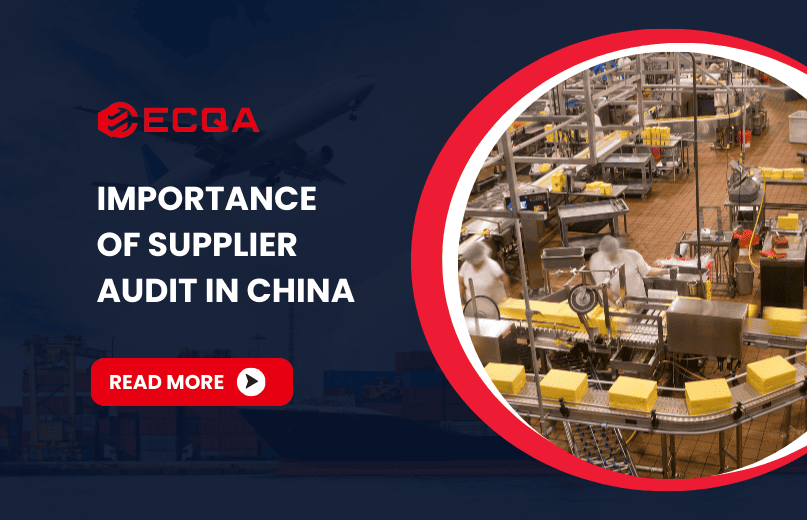
Supplier Audit in China: A Comprehensive Guide for Importers
A supplier audit is a systematic evaluation of a manufacturer’s facility, procedures, and management systems. The purpose is to confirm production capability, quality controls, workplace conditions, and compliance with relevant regulations. The audit helps importers assess whether the supplier can fulfill ongoing production needs and deliver goods that meet required standards.

Typical audit areas include:
- Factory profile and legal documents
- Machinery and production lines
- Quality management processes
- Incoming and outgoing inspections
- Worker safety and labor practices
- Environmental management
- Traceability and documentation
The results are summarized in a structured report used for supplier qualification and continuous performance monitoring.
Why Supplier Audits Matter in China
Ensuring Product Quality
Factories vary in consistency, process controls, and technical capability. A supplier audit reviews how materials are selected, how production is monitored, and how defects are managed. Strong controls help reduce defective goods and improve long-term product reliability.
Verifying Regulatory Compliance
Manufacturers serving international markets must follow safety, labeling, and performance regulations. A supplier audit examines documentation and operational evidence to confirm compliance with applicable standards in the destination country.
Supporting Ethical and Responsible Sourcing
Many buyers require responsible labor practices and safe working environments. Audits review wages, working hours, emergency exits, fire safety, and chemical management. This helps importers meet corporate responsibility commitments.
Building Reliable Supplier Partnerships
Clear visibility of a supplier’s strengths and weaknesses improves communication. Corrective actions can be tracked over time, creating a more stable and predictable production relationship.
Improving Efficiency and Reducing Waste
Audit findings often highlight areas where factories can streamline processes, reduce scrap, improve maintenance programs, or strengthen training. These improvements benefit both the supplier and the importer.
Preventing Supply Chain Disruptions
Audits evaluate whether factories maintain essential equipment, follow capacity planning, and manage inventory effectively. Strong operational controls help maintain consistency during peak seasons or unexpected events.
Supplier Audit Process
A supplier audit follows a structured sequence that ensures consistent evaluation.
1. Preparation
- Define audit scope and criteria
- Review product specifications
- Study supplier background and previous performance
- Prepare documentation requirements and checklists
- Confirm audit schedule with the factory
2. Opening Meeting
- Introduce audit objectives
- Review factory overview
- Confirm facility areas to be inspected
- Clarify on-site procedures
3. Facility Assessment
- Inspect production lines
- Review storage conditions for raw materials and finished goods
- Check equipment condition, maintenance, and calibration
- Observe workplace layout, cleanliness, and workflow
4. Documentation Review
Typical documents requested include:
- Quality manual and standard operating procedures
- Training records
- Incoming and outgoing inspection results
- Calibration certificates
- Equipment maintenance logs
- Payroll and attendance records (for social compliance)
- Environmental records and permits
5. Process Evaluation
- Review incoming material verification
- Examine in-process controls and checkpoints
- Confirm how non-conforming items are identified and managed
- Review testing and sampling procedures
- Check labeling, packaging, and shipment preparation
6. Worker Interviews (if included)
- Confirm understanding of safety procedures
- Review working hours and wages
- Assess familiarity with work instructions
7. Closing Meeting
- Present findings and non-conformities
- Discuss recommended improvements
- Confirm timelines for corrective actions
8. Reporting
A complete audit report summarizes evidence, ratings, photos, and recommendations. This serves as a reference for supplier approval, contract negotiation, and future monitoring.
Supplier Audit Checklist
| Audit Area | Key Elements Reviewed |
| Company Information | Business license, factory profile, export experience |
| Production Capability | Machinery, production lines, capacity, lead time |
| Quality Management | Procedures, inspection records, non-conformity handling |
| Incoming Materials | Supplier approval, material inspection, storage |
| Production Control | Work instructions, equipment condition, calibration |
| Final Inspection | Testing methods, sampling, defect classification |
| Social Compliance | Working hours, safety measures, fire exits, wages |
| Environmental Management | Waste handling, chemical storage, environmental permits |
| Security Controls | Warehouse access, visitor control, data security |
| Corrective Action System | Root cause analysis, corrective plans, follow-up |
Common Risks Found During Supplier Audits in China
Inconsistent Quality Controls
Some factories lack documented procedures or apply them inconsistently. This increases the risk of defects.
Weak Incoming Material Screening
Poor material checks can lead to quality variation and delays during production.
Limited Worker Training
Insufficient training affects accuracy, safety, and consistency across shifts.
Outdated or Incomplete Documentation
Missing calibration certificates, unclear inspection records, or outdated SOPs reduce traceability and compliance.
Labor and Safety Issues
Common issues include excessive overtime, blocked emergency exits, or missing protective equipment.
Environmental Gaps
Factories may lack proper chemical storage or approved waste management procedures.
When Importers Should Conduct Supplier Audits
- Before selecting a new supplier
- Before placing large or long-term orders
- When launching new product lines
- When performance issues increase
- When compliance requirements change
- When managing multi-tier supply chains
Regular audits allow buyers to maintain stable quality and reduce unexpected risks.
Working With a Third-Party Audit Company
A qualified third-party audit company provides independent verification using clear, standardized criteria. Benefits include:
- Local expertise and language capability
- Consistent audit procedures aligned with international standards
- Objective findings without conflicts of interest
- Coverage across major industrial regions
Importers rely on third-party auditors to identify gaps, verify corrective actions, and maintain long-term supplier performance.
Supplier audits in China provide essential visibility into a factory’s capability, quality management, and compliance status. They help importers prevent quality problems, ensure regulatory alignment, and maintain ethical sourcing practices. With a structured audit process and consistent follow-up, organizations can build stronger supplier relationships and achieve greater supply chain stability.
ECQA offers supplier audits and factory evaluations in major industrial regions including Shenzhen, Guangzhou, Shanghai, and Ningbo. With CNAS accreditation and ISO-based procedures, ECQA ensures each audit is professional, impartial, and fully aligned with international quality standards.
You can contact ECQA at market@ecqa.com to schedule a supplier audit in China and verify that your partners meet compliance and quality expectations.
Related Reading
Frequently Asked Questions about Supplier Audit in China
What is a supplier audit in China?
A supplier audit is a formal evaluation of a manufacturer’s facility, operations, and management system to ensure compliance with both buyer requirements and international standards.
Why should I conduct a factory audit in China?
A factory audit confirms supplier reliability, verifies product quality, and identifies risks before large-scale production begins. It also ensures that your supplier complies with legal and ethical standards.
How can a third-party inspection company assist?
An independent company such as ECQA provides unbiased verification, detailed reports, and corrective action guidance to help maintain supply chain integrity.
Which regions in China are covered by ECQA?
ECQA conducts audits in Shenzhen, Guangzhou, Shanghai, Ningbo, and other key manufacturing zones, offering nationwide coverage for supplier verification and inspection services.

 Request Free Sample Report
Request Free Sample Report